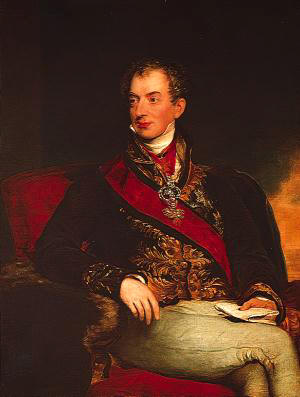 |
Prince Klemens von Metternich was an Austrian statesman, and the Austrian
minister of foreign affairs form 1809 to 1848. Metternich was also a champion of
conservatism. Metternich, the mediator at the Congress of Vienna, was an
insightful man. He knew that for the meeting to be a success, he would have to
modify his conservative ideals for a new Europe. It was a great success to
Metternich that the conference was held in Vienna. Wanting to secure the
Austrian predominance, Klemens tried to form German and Italian confederations,
both under Austrian rule. Along with Castlereagh, Metternich opposed the
elimination of France. Metternich also agreed that Russia must be kept form
obtaining too much control. Another plan that Metternich wanted to achieve at
the Congress of Vienna, was long-lasting order in Europe. But Klemensí biggest
hope for the Congress of Vienna was to restore conservative governments in the
new Europe. Metternich was able to achieve most of these goals, but neither a
German confederation nor an Italian confederation ever came about. Prince
Klemens craftily manipulated whole countries, for he was a master at controlling
people. In the end, Klemens obtain most of the things he wanted through strong
will and determination.
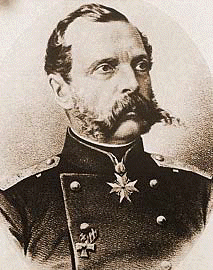 |
Czar Alexander I, the emperor of Russia from 1801-1825, was best known for his
alternately befriending, then fighting Napoleon I. In the early 1810ís
(1813-1815) Alexander helped form the Big Four, which finally defeated the
French emperor. As a part of the Congress of Vienna, the czar played a big part
in the agreement to balance power and to get along with one another. In this
meeting, Alexander was determined to obtain the only spoil that he wanted,
Poland. The allies (Britain, Russia, Prussia), afraid of the Asiatic Russians
obtaining too much control, only gave Russia a portion of Poland. Disgusted and
disillusioned by the cynicism of Metternich, Talleyrand, and Castlereagh towards
the idea of all people getting along, the czar formed the Holy Alliance in 1815.
With this group, Alexander I tried to create a world based on the ideas of
justice and charity.
Because of these radical and liberal ideas, czar Alexander I was thought to be
foolish and almost childish in his goals. Alexander was an idealist, and towards
his later year, the czar became even more involved in mystical and spiritual
events. Alexander was also a very religious man. He had such liberal ideas as
giving Poland a liberal constitution (this allowed Poland to be partially
restored) and funding universities and secondary schools in his country.
Alexander was unpredictable, and did many things on whims. For this reason, it
is thought that he might not have died in Taganrog, but moved to Siberia to
become a hermit.
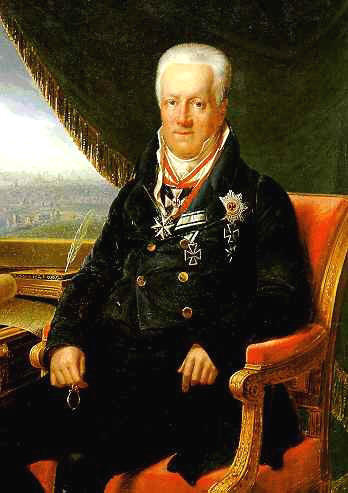 |
Karl von Hardenberg was a Prussian
statesman and the Prussian delegate in attendance at the Congress of Vienna.
Hardenberg was able to bring about the rapprochement between Russia and Britain
over the division of Saxony and Poland. He waved Prussian rights to Saxony in
return for the Rhineland. Hardenberg later associated himself with Alexander I
and his Holy Alliance. A resourceful man, Karl saw that some things must be
given up for the good of the continent.
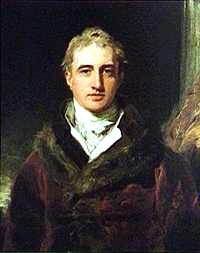 |
Viscount
Castlereagh was the British foreign secretary from 1812 to 1822. Castlereagh was
a major player in the Congress of Vienna. He was involved with the redrawing of
the post-Napoleonic map and was a major influence in the Concert of Europe. As a
leader in bringing together the powers they overthrew Napoleon and in forming
the Congress of Vienna, Castlereagh was a large influence in promoting diplomacy
by conference. The viscountís main objective at the Congress of Vienna was to
keep Russia from gaining too much control and to strengthen a weak Germany and
Italy. Castlereagh also took the lead in denying Russiaís territorial demands
on Poland. Throughout later years of his life, Castlereagh continued to oppose
Russian expansion.
The viscount was a thoughtful, introspective man who realized the dangers of an
ultra-powerful Russia. He was known for brilliant diplomatic techniques and
persuasive tactics. In 1821, Castlereagh became ill. He began to show signs of
abnormal suspicion, which in 1822 was full blown paranoia. The viscountís
reputation became soiled by vicious rumors. Unable to stand this disgrace,
Castlereagh committed suicide.
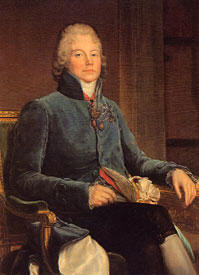 |
Charles
Talleyrand was a French statesman and a diplomat. He was the diplomat from
France assigned to the Congress of Vienna. With the interest of France,
Talleyrand managed to divide the Allies and to keep France in one piece. He did
this by forming an alliance with Britain and Austria. As this new alliance, the
three powers were able to prevent the splitting of French land. By sheer
cunning,
Talleyrand was able to obtain what he wanted. He was, quite arguably, the most skillful and best
diplomat that France has ever ha